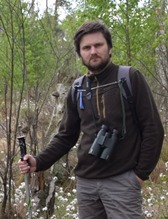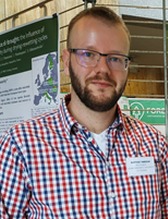Witold Wachowiak
| Job Title: | Professor |
| Room: | 123F |
| E-mail: | witwac@amu.edu.pl |
| Tel: | +48 61 829 5747 |
| www: | http://witwac-1.home.amu.edu.pl |

Research Interests
- Genetic basis of phenotypic traits variation and local adaptation
- Genetic variation and speciation in plants
- Adaptation and hybridization in species contact zones
- Marker assisted breeding and genomic selection in forest trees
- Development of novel genomic resources and genetic markers
- Molecular taxonomy
Brief CV
I did my PhD in Genetics in 2003, and since 2019 I have been employed a full professor at the Faculty of Biology, Adam Mickiewicz University in Poznań, Poland. In my research, I focus on molecular methods to analyze the processes determining the distribution and genetic variation of plant populations, especially forest tree species. I lead several teaching courses in the field of population genetics, molecular ecology and genomics. I developed my research and teaching experience working abroad in research centers at the University of Oulu in Finland and the Center for Ecology and Hydrology in Great Britain. My research was financially supported from several projects from EU and the National Environment Research Council, UK. I also participated in about twenty national-funded projects, acting as PI in six projects from the National Science Center (NCN), Poland. I was a member of the NCN expert team and a reviewer in several international scientific programs.
Qualifications
- Full Professor (2018)
- Postdoctoral academic title (habilitation) in Biological Sciences – Adam Mickiewicz University in Poznań, Poland (2012)
- PhD (Genetics) – Adam Mickiewicz University in Poznań, Poland (2003)
- MSc (Biotechnology) – Adam Mickiewicz University in Poznań, Poland (1999)
Teaching
- Conservation genetics
- Population genomics
- Biotaxonomy
- Biotechnology of woody plants
- Molecular Ecology
Publications
- Perry A., Wachowiak W., Downing A., Talbot R., Cavers S. (2020) Development of a SNP array for population genomic studies in four European pine species. Molecular Ecology Resources, DOI: https:/doi.org/10.1111/1755-0998.13223[PDF]
- Łabiszak B., Zaborowska J., Wójkiewicz B., Wachowiak W. (2019) Molecular and paleo‐climatic data uncover impact of ancient bottleneck on demographic history and contemporary genetic structure of endangered Pinus uliginosa. Journal of Systematics and Evolution, DOI: https:/doi.org/10.1111/jse.12573
- Zaborowska J., Łabiszak B., Wachowiak (2019) Population history of European mountain pines Pinus mugo and Pinus uncinata revealed by mitochondrial DNA markers. Journal of Systematics and Evolution, DOI: https:/doi.org/10.1111/jse.12520
- Wachowiak W,. Zaborowska J., Łabiszak B., Perry A., Zucca GM., González-Martínez SC., Cavers S. (2018) Molecular signatures of divergence and selection in closely related pine taxa. Tree Genetics & Genomes, 14:83 [PDF]
- Wachowiak W., Żukowska WB., Wójkiewicz B., Cavers S., Litkowiec M. (2016) Hybridization in contact zone between temperate European pine species.Tree Genetics & Genomes, DOI: 10.1007/s11295-016-1007-x [PDF]
- Wachowiak, W., Trivedi, U., Perry, A., Cavers, S. (2015). Comparative transcriptomics of a complex of four European pine species. BMC Genomics16: 234. [PDF]
- Wachowiak W.,Palmé A.E., Savolainen O. (2011). Speciation history of three closely related pines Pinus mugo (T.), uliginosa (N.) and P. sylvestris (L.). Molecular Ecology 20: 1729–1743. [PDF]










